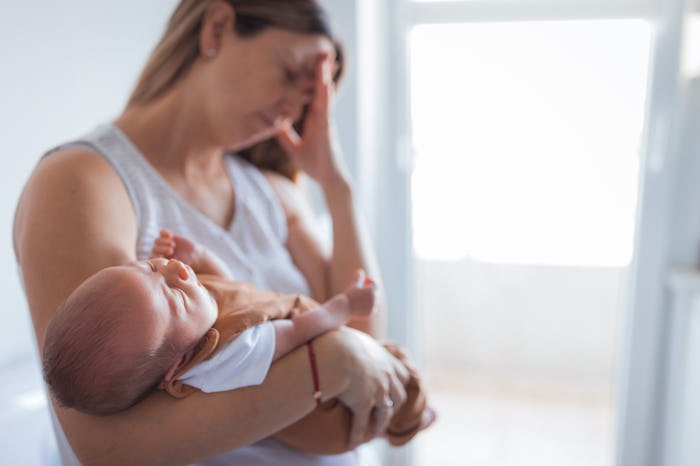Postpartum

Everything You Need To Know About Postpartum Headaches
The solution may be as simple as a glass of water.
After having a baby, you expect to feel all kinds of aches and pains as your body recovers, but how do you know what’s normal and what should warrant a call to your doctor? Postpartum headaches are one of those symptoms that could mean nothing or could be a sign that something bigger is going on, so it’s important to monitor when they are occurring as well as their intensity. There are a handful of reasons you may be experiencing postpartum headaches, and they range from something as simple as dehydration to rare diagnoses.
Causes Of Postpartum Headaches
The first clue for what is causing your postpartum headache is typically when you’re experiencing it — whether it’s immediately following delivery or in the days and weeks following your baby’s birth. “For women who have an epidural, sometimes a new postpartum headache can be due to a spinal puncture with a leak of cerebral spinal fluid,” Elizabeth G. Livingston, MD, a maternal-fetal specialist at Duke Health, tells Romper in an email. Livingston further explains that the pain from these types of headaches will intensify when mom is sitting up.
Another reason a new mom may experience a headache soon after they deliver the baby is postpartum preeclampsia. “Persistent or postpartum preeclampsia is not that uncommon,” says maternal-fetal specialist Andra H. James, MD, MPH, though in this case, the headache would be one of several possible symptoms including swelling, nausea, and shortness of breath, according to the Preeclampsia Foundation. Other serious postpartum complications that James says can result in headaches include cerebral vein thrombosis or stroke, however, she points out these are incredibly rare.
Headaches that happen in the days and weeks following delivery are more likely to be caused by things other than your body’s recovery. “Sometimes dehydration and/or lack of sleep can cause headaches,” OB/GYN Tamika C. Auguste MD FACOG, tells Romper in an email, “[and] stress can also cause headaches.” All of these causes are totally understandable for new moms because it’s an incredibly stressful time, sleep is limited, and taking care of your own needs (like hydration) often gets put on the backburner when you’re trying to master keeping an infant happy.
Postpartum Headache Treatment & Safe Medications
Treatment options for postpartum headaches vary based on what is causing them. If the issue is dehydration then water is the key, and if it’s sleep deprivation then the headache may ease up with some rest (though that’s hard to come by). There’s not a whole lot you can do to eliminate stress during the postpartum period, in which case over-the-counter medications may help. “Medications used to treat headaches such as Tylenol and NSAIDs are considered safe,” says James, however she says new moms should always contact their healthcare provider before taking any prescription headache medication (such as for migraines).
For the more serious headaches that come on immediately following birth, they typically need medical intervention. For example, headaches caused by a spinal puncture may get better with some IV fluid hydration or they could require help from the anesthesiologist. “[These headaches] can be treated specifically with hydration and occasionally a ‘blood patch’,” explains Livingston, “[this is the] insertion of a small amount of the patient’s blood into the epidural space.”
Postpartum Headaches & Breastfeeding
According to James, breastfeeding itself is not a cause for headaches, but it may not be entirely unrelated to the cause. “Breastfeeding has not been identified as a contributing factor to headaches in the postpartum period, but lack of sleep or interrupted sleep are risk factors for headaches,” she says, “Lack of sleep and interrupted sleep go hand in hand with breastfeeding.” Similarly, Auguste notes that women can often become dehydrated while breastfeeding, which could then result in a headache (so it’s always smart for breastfeeding parents to keep a bottle of water nearby).
Another way Livingston says breastfeeding can contribute to postpartum headaches is simply because of the tension involved. “I have seen tension headaches from moms holding their arms and shoulders in awkward positions while breastfeeding,” she says, “[to avoid this] Use a supportive chair and pillows to avoid slumping over or holding arms and shoulders in an uncomfortable position that might lead to a tension headache.”
When To See A Doctor
“A new mom should see a doctor if her headaches are unlike any she has ever experienced, if it’s accompanied by high blood pressure, or if it’s accompanied by visual disturbances,” says James, any of these situations should prompt a trip to the emergency room. If you’re not having any associated alarming symptoms, but the headache isn’t getting better with any over-the-counter medication, Auguste notes it would be appropriate to contact a healthcare provider.
It’s important to remember that the more serious complications that result in postpartum headaches are rare, and they often happen immediately following delivery when moms are still under the care of their healthcare providers, so they’re usually caught and treated quickly. Otherwise, a postpartum headache can simply be the body’s way of telling a new mom she needs to take care of herself, whether through rest, hydration, or some other form of self care.
Experts:
Tamika C. Auguste MD FACOG, Chair- Women's and Infants' Services, MedStar Washington Hospital Center, Regional Director of Women's Health Services- Southern Maryland Peninsula, Chair- OBGYN Clinical Practice Council, MedStar Health, and Professor, OBGYN Georgetown School of Medicine
Andra H. James, MD, MPH, Maternal-Fetal Medicine Specialist at Duke Health
Elizabeth G. Livingston, MD, Maternal-Fetal Medicine Specialist at Duke Health